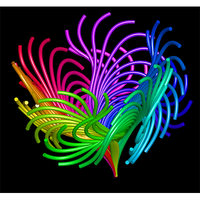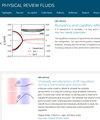主动丝从力模型的分岔和非线性动力学
IF 2.5
3区 物理与天体物理
Q2 PHYSICS, FLUIDS & PLASMAS
引用次数: 0
摘要
生物丝-运动蛋白复合物在生物学中无处不在,在细胞水平上驱动着对许多基本生命过程至关重要的货物运输。在运动过程中,运动蛋白会对其连接的丝施加压缩力。如果丝状物以某种方式被夹住或拴住,这种力就会导致弯曲和随后的一系列动态变化。追随者力模型是一种简单的细丝模型,它在细丝顶端施加单一的压缩力,这种模型正被广泛用于描述被运动蛋白压缩的弹性细丝(如微管)。根据力值的不同,人们可以观察到不同的状态,包括旋转、跳动和蠕动,但导致这些状态的分叉还不完全清楚。在本文中,我们利用计算动力系统的技术来确定和描述这些分岔。我们跟踪新出现的时间周期分支,并确定准周期状态。我们研究了细丝纤度对分岔的影响,并以此全面概述了随从力模型中出现的动力学。本文章由计算机程序翻译,如有差异,请以英文原文为准。

Bifurcations and nonlinear dynamics of the follower force model for active filaments
Biofilament-motor protein complexes are ubiquitous in biology and drive the transport of cargo vital for many fundamental life processes at the cellular level. As they move, motor proteins exert compressive forces on the filaments to which they are attached. If the filament is clamped or tethered in some way, this force leads to buckling and a subsequent range of dynamics. The follower force model, in which a single compressive force is imposed at the filament tip, is a simple filament model that is becoming widely used to describe an elastic filament, such as a microtubule, compressed by a motor protein. Depending on the force value, one can observe different states including whirling, beating, and writhing, though the bifurcations giving rise to these states are not completely understood. In this paper, we utilize techniques from computational dynamical systems to determine and characterize these bifurcations. We track emerging time-periodic branches and identify quasiperiodic states. We investigate the effect of filament slenderness on the bifurcations and, in doing so, present a comprehensive overview of the dynamics which emerge in the follower force model.
求助全文
通过发布文献求助,成功后即可免费获取论文全文。
去求助
来源期刊

Physical Review Fluids
Chemical Engineering-Fluid Flow and Transfer Processes
CiteScore
5.10
自引率
11.10%
发文量
488
期刊介绍:
Physical Review Fluids is APS’s newest online-only journal dedicated to publishing innovative research that will significantly advance the fundamental understanding of fluid dynamics. Physical Review Fluids expands the scope of the APS journals to include additional areas of fluid dynamics research, complements the existing Physical Review collection, and maintains the same quality and reputation that authors and subscribers expect from APS. The journal is published with the endorsement of the APS Division of Fluid Dynamics.
 求助内容:
求助内容: 应助结果提醒方式:
应助结果提醒方式:


